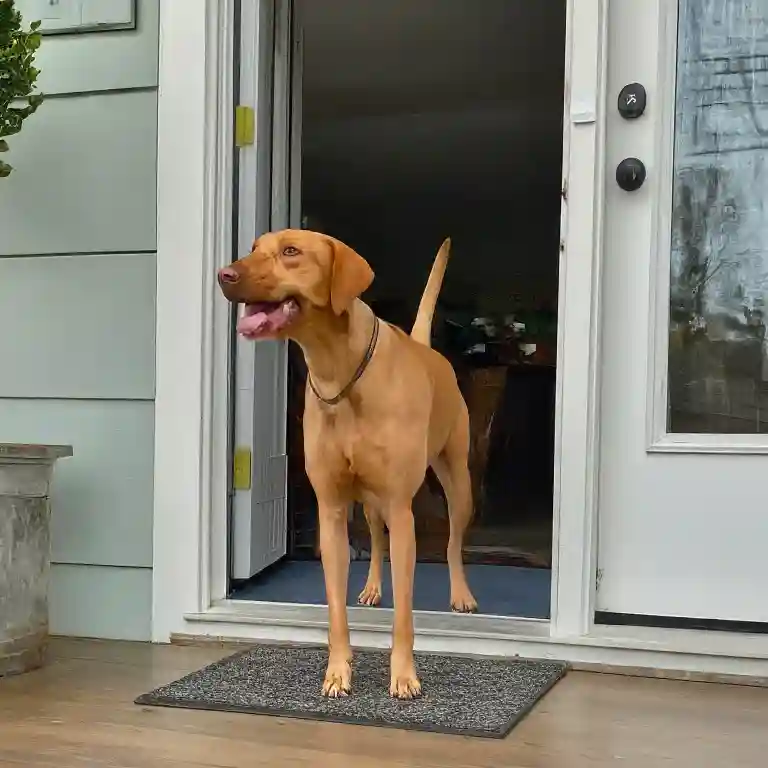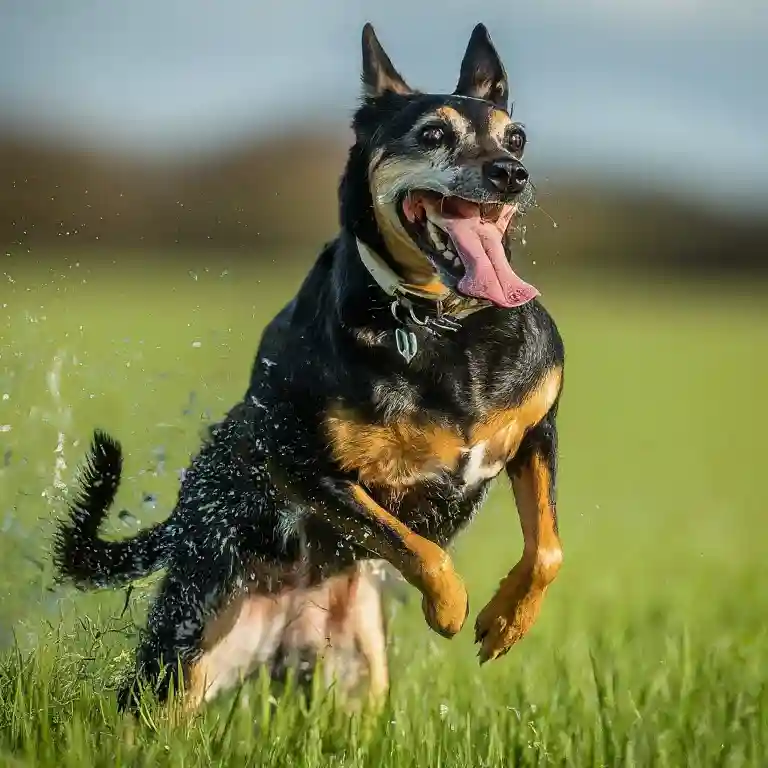How Long Can Dogs Hold Their Pee? The answer varies by age, size & health. Puppies and older dogs often need more frequent breaks.
In this blog, I’ll explain the pee-holding durations for different dog ages & sizes & some tips to manage their bathroom needs effectively.
How Long Can Dogs Hold Their Pee?
Dogs can hold their pee for 6-8 hours, but this can change based on age, size & health.
Puppies & older dogs might need to go outside more often. Below, I’ve shared pee duration for dogs of different ages on a table.
| Age/Size of Dog | Duration They Can Hold Pee |
| Puppies | 1 hour per month of age (e.g., a 3-month-old puppy can hold it for about 3 hours) |
| Adult Small Breeds | 4-6 hours |
| Adult Medium Breeds | 6-8 hours |
| Adult Large Breeds | 8-10 hours |
| Senior Dogs | 2-4 hours |
What Happens If A Dog Holds Pee Too Long?

If a dog holds its pee for too long, it can cause a few problems like discomfort, bladder stretching, accidents, etc.
- Discomfort: The dog might feel uneasy or restless & try to find a place to go. They may also seem stressed. This is like when dog owners worry about their dog breathing heavy, which could also mean there’s a health problem.
- Urinary Tract Infections (UTIs): Keeping urine in too long can increase the risk of infections because bacteria can grow in the bladder. This is like when dog owners worry about why is my dog breathing so fast while sleeping, which could signal a health issue.
- Bladder Stretching: Regularly holding pee for too long can stretch the bladder which can cause long-term problems.
- Behavioral Issues: Dogs that often have to hold their pee may develop anxiety or behavioral problems related to bathroom breaks. It’s important to notice these problems early, just like why does my dog suck on blankets, which can also be a sign of stress.
- Accidents: If the dog can’t hold it any longer, they might have an accident inside the house, especially if they’re dealing with problems like how long can a dog go without pooping.
How To Help Your Dog Manage Their Bathroom Needs?

To help your dog manage their bathroom needs, you can try these simple tips which I also used.
- Stick to a Routine: You can take your dog outside regularly, like after meals, naps & playtime.
- Pick a Bathroom Spot: Choose a specific area in your yard for bathroom breaks & take your dog there each time.
- Use Positive Reinforcement: Praise & reward your dog right after they go outside. This helps them know they’re doing the right thing.
- Track Food & Water: Watch how much your dog eats & drinks to predict when they’ll need to go out. Avoid giving too much water before bed to reduce nighttime pee situations.
- Watch for Signs: You can look for some signs that your dog needs to go, like pacing, whining, or heading to the door.
- Crate Training: A crate can help with house training because dogs usually don’t want to soil their sleeping area which encourages them to hold it until they’re let outside.
- Handle Accidental Pee Situations Calmly: You can clean up accidental pee situations to remove odors & avoid punishing your dog because it can cause anxiety.
- Check Their Health: Frequent accidents or changes in bathroom habits might mean a health issue. You can consult with your vet if needed.
- Adjust for Age: Puppies & older dogs might need more frequent bathroom breaks. So, be flexible with their schedule.
- Use Diapers or Pads: For dogs with special needs or those who can’t make it outside on time, you can consider having doggie diapers or pads for your dog.
Factors Affecting How Long Dogs Can Hold Their Pee

Many factors can affect how long a dog can hold their pee like their age, size, health, diet, activity level, etc.
- Age: Puppies need more frequent breaks due to their smaller bladders & less control. Older dogs might also need more frequent bathroom breaks because of weaker bladder control.
- Size: Smaller dogs generally have smaller bladders & may need to go out more often than larger dogs.
- Health: Health issues like urinary tract infections, diabetes, or kidney problems can affect a dog’s ability to hold their pee. If a dog starts having accidental pee situations or needs to go out more often, you can visit a vet.
- Diet & Hydration: The amount of water a dog drinks & the type of food they eat can affect how often they need to urinate. Foods with high water content or increased water intake can cause more frequent bathroom breaks.
- Activity Level: Active dogs may need to go out more often due to higher fluid intake & metabolism. Less active dogs may have more predictable bathroom needs.
- Training & Habits: Well-trained dogs with set routines can hold their pee longer compared to those with irregular schedules or less training.
- Bladder Capacity: Just like people, dogs have different bladder capacities. Some can naturally hold their pee longer than others.
- Environment: Stress, anxiety, or changes in the environment can impact bathroom habits. Nervous or unsettled dogs may need to go out more often.
- Medical Conditions: Conditions like incontinence or bladder stones can affect a dog’s ability to hold their pee. You can consult with a vet if you see some medical issue with your dog.
Signs Your Dog Needs To Pee

Here are some common signs that your dog needs to pee like pacing, barking, circling, sniffing, etc.
- Pacing: They may walk around the house or yard restlessly.
- Whining or Barking: They might make noises to get your attention.
- Scratching or Nosing at the Door: If your dog scratches or nudges the door, they might be asking to go outside.
- Circling: Dogs often circle as they try to find a spot to relieve themselves.
- Restlessness: If your dog seems unusually agitated or restless, they might need to go out.
- Sniffing Around: They might sniff around the house or yard looking for a spot.
- Looking at You: They may give you an expectant or urgent look, especially if they’re used to a routine.
- Dropping to the Floor: Some dogs may drop to the floor or assume a submissive posture when they need to go out.
- Accidents in the House: If your dog has an accident inside, it’s a sign they can’t hold it any longer.
- Behavioral Changes: Any sudden changes in behavior, like increased anxiety or discomfort, might be related to their need to pee.
Conclusion
In conclusion, understanding how long can a dog go without peeing & what impacts their bathroom needs is crucial for their well-being.
By considering factors like age, size & health & setting routines & training, you can help your dog stay comfortable & avoid issues.
FAQs
Can dogs hold pee for 12 hours overnight?
Yes, many dogs can hold their pee for up to 12 hours overnight, especially if they’re healthy & have a routine. However, some dogs, particularly puppies or older dogs, may need more frequent breaks.
Can dogs go 24 hours without peeing?
Dogs should not go for 24 hours without peeing. Holding urine for a long period can cause discomfort, health issues, or urinary tract infections. If this happens, consult a veterinarian.
Why does my dog not pee for 12 hours?
If your dog doesn’t pee for 12 hours, it could be due to a well-regulated routine, reduced water intake, or a medical issue.
How long can a 2 year old dog hold their pee?
A 2-year-old dog can hold their pee for about 6-8 hours during the day and up to 8-12 hours overnight.
Do dogs need to pee before bed?
Yes, letting dogs pee before bed is a good idea to avoid accidents and ensure they’re comfortable throughout the night.
Should I punish my dog for peeing in my bed?
No, you shouldn’t punish your dog. Instead, solve the issue by understanding the cause, such as medical problems & better managing their environment & routine.
Can dogs accidentally pee in their sleep?
Yes, dogs can accidentally pee in their sleep, especially if they have bladder issues, are very young or old, or are experiencing medical conditions.
How can you tell if a dog’s bladder is full?
You can tell if a dog’s bladder is full by observing signs like restlessness, frequent circling, whining, or attempting to urinate in inappropriate places.
How long can dogs hold their pee during the day?
During the day, dogs can usually hold their pee for 4-6 hours.
How long can a dog go without peeing before it is dangerous?
Dogs can generally hold their urine for 8-10 hours. Going longer can cause discomfort, urinary tract infections, or more serious health issues.
How long can a 5 month old puppy hold its bladder?
A 5-month-old puppy can hold its bladder for about 4-6 hours. Puppies generally need more frequent bathroom breaks as they’re still developing bladder control.

I love animals & want to know more about different creatures & sharing their stories with everyone. From my childhood, I’ve been exploring forests & watching animals in their homes.
Now, I write about my adventures & all the amazing things I learned. My blogs are easy to understand & make you want to know more about animals. I teach about why animals are important & why we should take care of them.

